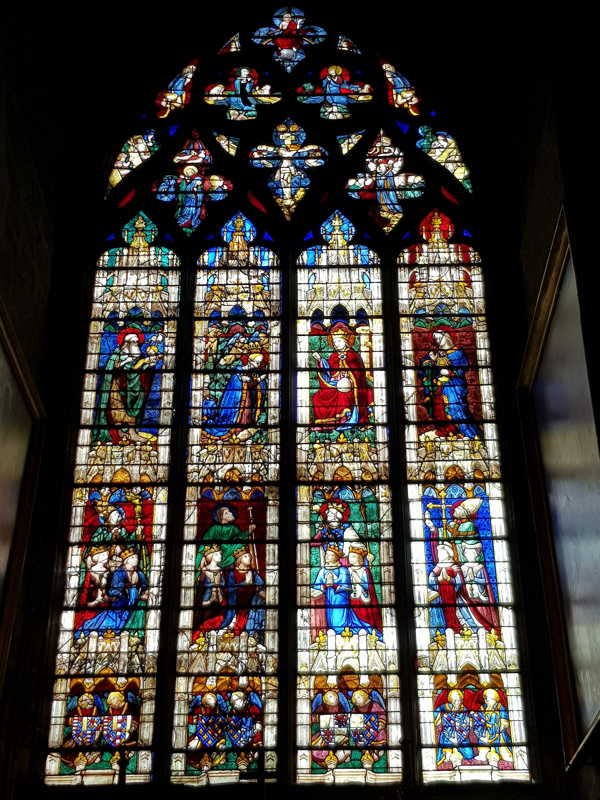



La vetrata di Carlo Magno e la messa di Sant’Egidio
Evangelium Matt 6:24-33
In illo témpore: Dixit Iesus discípulis suis: Nemo potest duóbus dóminis servíre: aut enim unum ódio habébit, et álterum díliget: aut unum sustinébit, et álterum contémnet. Non potéstis Deo servíre et mammónæ. Ideo dico vobis, ne sollíciti sitis ánimæ vestræ, quid manducétis, neque córpori vestro, quid induámini. Nonne ánima plus est quam esca: et corpus plus quam vestiméntum? Respícite volatília cœli, quóniam non serunt neque metunt neque cóngregant in hórrea: et Pater vester cœléstis pascit illa. Nonne vos magis pluris estis illis? Quis autem vestrum cógitans potest adiícere ad statúram suam cúbitum unum? Et de vestiménto quid sollíciti estis? Consideráte lília agri, quómodo crescunt: non labórant neque nent. Dico autem vobis, quóniam nec Sálomon in omni glória sua coopértus est sicut unum ex istis. Si autem fænum agri, quod hódie est et cras in clíbanum míttitur, Deus sic vestit: quanto magis vos módicæ fídei? Nolíte ergo sollíciti esse, dicéntes: Quid manducábimus aut quid bibémus aut quo operiémur? Hæc enim ómnia gentes inquírunt. Scit enim Pater vester, quia his ómnibus indigétis. Quǽrite ergo primum regnum Dei et iustítiam eius: et hæc ómnia adiiciéntur vobis.
Gospel Matt 6:24-33
At that time, Jesus said to His disciples: No man serve two masters; for either he will hate the one and love the other, or else he will stand by the one and despise the other. You cannot serve God and mammon. Therefore I say to you, do not be anxious for your life, what you shall eat; nor yet for your body, what you shall put on. Is not the life a greater thing than the food, and the body than the clothing? Look at the birds of the air: they do not sow, or reap, or gather into barns; yet your heavenly Father feeds them. Are not you of much more value than they? But which of you by being anxious about it can add to his stature a single cubit? And as for clothing, why are you anxious? Consider how the lilies of the field grow; they neither toil nor spin, yet I say to you that not even Solomon in all his glory was arrayed like one of those. But if God so clothes the grass of the field, which flourishes today but tomorrow is thrown into the oven, how much more you, O you of little faith! Therefore do not be anxious, saying, ‘What shall we eat?’ or, ‘What shall we drink?’ or, ‘What are we to put on?’ – for after all these things the Gentiles seek; – for your Father knows that you need all these things. But seek first the Kingdom of God and His justice, and all these things shall be given you besides.
Oggi si ricorda S. Egidio Abate. Originario di Atene giunse in Francia nell’ottavo-nono secolo.
Alcuni episodi della vita del santo sono illustrati da due vetrate e da una scultura del portale della cattedrale di Chartres. E’ raffigurato mentre celebra la Messa e ottiene il perdono di un peccato che l’imperatore Carlo Magno (768-814) non aveva osato confessare a nessun sacerdote.
Nella leggenda di Egidio possiamo vedere un riscontro del vangelo. Egidio ha lasciato tutto per Dio, vivendo nei boschi e nutrendosi solo dei frutti della natura.
Molto spesso non comprendiamo di doni che Dio ci fa. Ma si tratta della Provvidenza che interviene a soccorrerci nel momento del bisogno.
Ricordiamo dunque le parole di gesu’: “Cercate prima, quindi, il regno di Dio e la sua giustizia, e ogni altra cosa vi verrà data in piú.“
Sia lodato Gesu Cristo!
Today we remember S. Egidio Abate. Originally from Athens, he arrived in France in the eight-ninth century.
Some episodes in the life of the saint are illustrated by two stained glass windows and a sculpture of the portal of the cathedral of Chartres. He is depicted celebrating Mass and obtaining forgiveness for a sin that Emperor Charlemagne (768-814) had not dared to confess to any priest.
In the legend of Egidio we can see a confirmation of the gospel. Egidio left everything for God, living in the woods and feeding only on the fruits of nature.
Very often we do not understand about the gifts that God gives us. But it is about Providence who intervenes to help us in times of need.
Let us therefore recall the words of Jesus: “Seek first, therefore, the kingdom of God and his justice, and everything else will be given to you more.”
Praised be Jesus Christ!